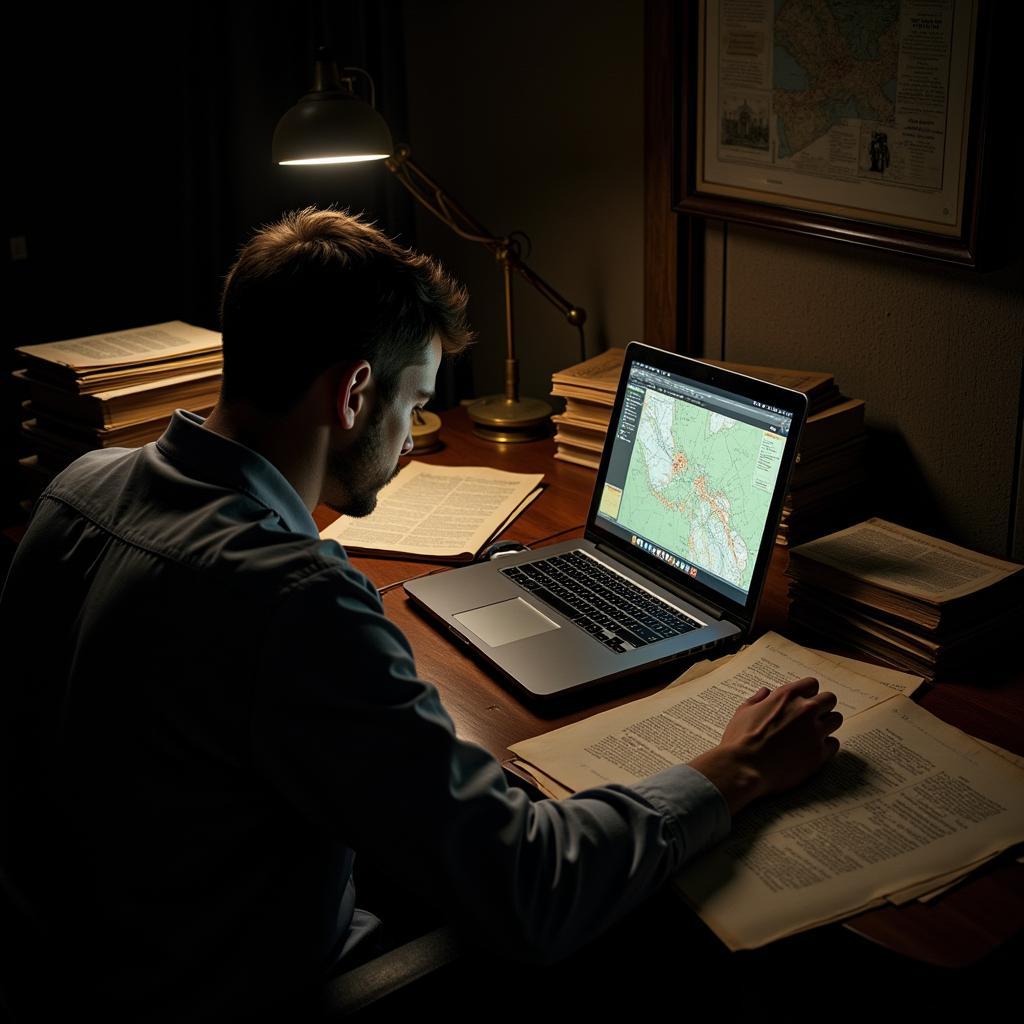Desk research. It’s the cornerstone of any serious investigation, especially in the realm of the paranormal. Whether you’re tracking down a spectral entity or investigating a UFO sighting, understanding the Desk Research Definition is paramount to success. This initial phase of information gathering allows researchers to build a foundation of knowledge before venturing into the field, potentially saving valuable time and resources.
What is Desk Research? A Deep Dive into the Definition
Desk research, also known as secondary research, involves gathering existing information from published sources. This can include anything from books and journals to online databases and government reports. It’s the investigative legwork you do from the comfort of your own desk, hence the name. This method provides a crucial framework for understanding the history, context, and potential explanations for paranormal phenomena.
Why is Desk Research Important in Paranormal Investigations?
Imagine you’re investigating a haunted house. Would you barge in, EMF meter blazing, without first learning about the property’s history? Probably not. Desk research allows you to uncover previous accounts of paranormal activity, historical records, and even architectural blueprints that could shed light on the strange occurrences. This preliminary investigation can help identify patterns, potential triggers, and even rule out mundane explanations.
Key Benefits of Desk Research
- Cost-effective: Desk research is often significantly cheaper than primary research methods like conducting interviews or field experiments.
- Time-saving: Accessing pre-existing information is generally faster than collecting new data.
- Foundation building: Provides a comprehensive overview of the subject matter, allowing for more focused primary research.
- Identifying gaps in knowledge: Helps pinpoint areas where further research is needed.
 Desk Research in Paranormal Investigation
Desk Research in Paranormal Investigation
Desk Research Methods: Where to Find the Information You Need
So, where do you start your desk research journey? The resources available are vast and varied. Here are a few key areas to explore:
- Libraries: Libraries remain treasure troves of information, offering access to books, journals, newspapers, and local historical archives.
- Online Databases: Databases like JSTOR, ProQuest, and even Google Scholar provide access to academic articles, research papers, and other scholarly works.
- Government Records: Government agencies often hold valuable data on a wide range of topics, including unexplained phenomena.
- Historical Societies: Local historical societies can be excellent sources of information on specific locations or events.
- Online Forums and Communities: While requiring careful scrutiny, online communities dedicated to paranormal research can offer valuable anecdotal evidence and lead to other sources.
Evaluating the Credibility of Your Sources
Not all sources are created equal. It’s crucial to critically evaluate the credibility of the information you find. Consider the author’s credentials, the publication’s reputation, and the evidence presented. Look for sources that are unbiased, peer-reviewed, and backed by verifiable evidence.
Desk Research vs. Field Research: A Complementary Approach
Desk research and field research are not mutually exclusive. In fact, they are complementary components of a thorough investigation. Desk research provides the groundwork, while field research allows you to test hypotheses, gather new data, and experience the phenomenon firsthand.
Dr. Evelyn Reed, a renowned parapsychologist, emphasizes the importance of this synergy: “Desk research informs field research. It provides the context, the history, and the potential explanations that guide our investigations in the field.”
Desk Research Examples in Paranormal Investigations
Imagine researching a supposed haunted location. Desk research might reveal historical records indicating past tragedies, eyewitness accounts of unusual occurrences, or even architectural features that could contribute to the perceived haunting. This information can then inform your field research by suggesting areas to focus on, equipment to use, and questions to ask.
Conclusion: Desk Research is the Essential First Step
Desk research is the indispensable first step in any serious paranormal investigation. By thoroughly exploring existing information, you can build a strong foundation of knowledge, refine your research questions, and maximize the effectiveness of your field investigations. So, before you grab your ghost hunting gear, remember the power of desk research – unlocking mysteries from your desk.
 Desk Research: The Essential First Step
Desk Research: The Essential First Step
FAQs about Desk Research
- What is the difference between desk research and primary research?
- Where can I find reliable sources for desk research?
- How can I evaluate the credibility of online sources?
- How much time should I dedicate to desk research?
- What are some common mistakes to avoid in desk research?
- How can I organize my desk research findings?
- Can desk research be used on its own, or should it always be combined with field research?
Need help with your Paranormal Research? Contact us 24/7:
Phone: 0904826292
Email: research@gmail.com
Address: No. 31, Alley 142/7, P. Phú Viên, Bồ Đề, Long Biên, Hà Nội, Việt Nam.